Over the week leading up to the race, the swells became smaller and smaller and a high pressure area that is usually located over the Azores had moved to Portugal for the week. This meant there was not going to be any wind. You could see the smile on the faces of most paddlers vanish as Windguru kept forecasting 4 mph winds from the side – except for the European sprint paddlers who saw their chances skyrocket like a dot com stock in the nineties.But on race day, the winds were slightly better than expected: The wind blew at about 8 or 9mph, but still mostly from the side, with 2 foot swells roughly in race direction. The swells moved fast and were small, so they were hard to catch. Here’s Team USA with Beata, Borys, and myself. Mike Brumbaugh was racing as well, but we couldn’t find him for the picture.
Team USA was all smiles, but our lack of anxiety about challenging ocean conditions was soon replaced with worries about the start:
The start would be from the beach, using paddle locks to line up paddlers about 100 feet up the beach. Then we would have to sprint down to our skis, run into the shallow water and jump into our boats. The lock had U shaped spots for each paddle. There was a bar over the U that kept the paddles from being removed until the bar was pulled out manually by a starter. Each lock had 25 spots, spaced about a foot apart, so there were 12 or so of these locks, that would all be unlocked at exactly the same time by twelve volunteers who had to pull very hard on a handle that caused all 25 paddles to be unlocked.
Another issue was that there was only about a foot of space for each boat in the line-up by the beach. I even ended up getting into a fight with another paddler who moved my boat because he thought it was not in the right spot. This race was the main event of the season for each one of us and the biggest surfski race we had ever been in for most. Our Aloha spirits were wearing thin.
Before the race I had talked to Andre a bit more, who – as the CEO of the main sponsor Nelo – wore many hats for this race: Organizer, Commentator, Starter and most importantly, the man who would have to decide which of the three wind window days would be best. Unfortunately it was clear pretty early on that even the best of the three days would still be far from a howling downwind, and it was obvious that he felt depressed about that. His face only lit up when he talked about the start: “300 boats, less than half a meter apart. It will be a massacre!” he told me as excited as a kid about to see his first Monster Truck Demolition Derby.
The start procedure was purposely designed to be as fair as possible, but also to be nerve wrecking for the racers: There was a one minute warning, then a heart-beat sound kept playing (much slower than my heart rate at that time), and the start signal could be any time after the 60 second warning. It might come at the first second or the 59th second.
Over three hundred of the best paddlers were lined up behind a line of surfskis that was about 300×16.9 inches long, each one carefully placed to be as close to the water as possible while not getting swept away by the incoming tide. It was probably a magnificent sight, but my paddle was stuck in the lock and I was sandwiched standing between a left handed paddler from GB, and Ola who – like all people from Sweden – was about 3 heads taller than me and is a super fast paddler.
As soon as the horn sounded everyone was off for the short sprint down to the boat, but not the 25 paddlers in my lock: The lock jammed and we could not get our paddles out. It felt like it took an eternity for the lock to open, but when I looked at the video later it was only 2 or 3 seconds. But that was enough for the other paddlers to be halfway to the water already. If you’ve ever done a beach start, you will know that they are surprisingly competitive and the slightest hesitation will be rewarded with a position at the back of the pack.
I had the worst possible start one could imagine: By the time I got my boat in the water I was just slightly behind Ola, but I was in such a hurry that I flipped over while getting on the boat, just like in the life saving event from Sunday a week ago. A stupid mistake, because the start was super easy: There were no waves at all and the water was less than knee deep. It can’t get any easier really. But still I found myself sitting next to my boat in the water, with the hydration hanging off the side of the boat and the boat completely filled up with water. So I stood up, put the hydration system back, got in the boat, opened the bailer, and started paddling until the water finally drained. By that time there must have been 80 people or more in front of me. All I could see was a sea of bright colored caps and life vests.
Weeks before the race I had determined who my main competition for the world championship title in the 40-44 age class would be. Since my competition was spread out over 4 continents, I had never raced against any of them. Through a method of triangulation between paddlers who I had paddled against and those competitors, I had narrowed my main competition down to the following:
Michael Dobler from Germany, because – having lost to a lot of paddlers from Germany before – I have a healthy respect for them, and Michael was one of the top Non-SA and Non-Aus competitor in the Surfski.info world series a year or two ago.
Glenn Eldridge from GB – the winner of the Icon Classic and GB surfski champion
Jim Walker from Australia – a former Olympic Sprint Kayaker who now runs the mykayakcoach.com site
Tommy Woodriff – one of the best Australian Surfskiers and Jim Walkers long-time Rival
Mark Ressel – winner of multiple GB surfski national races
But these were just the ones who had registered early and the number of entries in my class had almost doubled since I made these calculations, so I was not sure who else might be a challenge. But I knew that Clint Robinson from Australia did not come to the race. My tactic had been to spot the five of them, hang on to the fastest one and overtake him before the finish. A simple tactic, but it fell in the water with my hydration system. I couldn’t spot anyone in the huge field of paddlers in front of me, because I was too far back.
Every single one of the 80 paddlers in front of me was paddling hard, they’d come from far away to give their best and there was not a single one who was easy to overtake, but I made up some ground in the first ten minutes and finally spotted a few known faces (backs rather) in front of me: Mark Ressel was 100 feet ahead and Glenn Eldridge another 100 feet.
The race course took us out from the beach about 1.5 miles, then about 12 miles parallel to the coast and then around a final turn buoy a few hundred meters out from the coast, where you would drop off your boat and run up the steep incline of the finish beach through a huge inflatable gate. Along the course were a few break walls, lighthouses and small, rocky islands.
After the first turn buoy I had overtaken Mark Ressel and I had Glenn in my sight, about 20 seconds ahead of me. I could see none of the other paddlers I was worried about. But I spotted Daniel Viloria and Joep Van Bakel to my left. This told me I was going pretty fast because I knew that Daniel and Joep were usually faster than me. Even though I didn’t really know, I decided to assume that Glenn was the only one of the five who was ahead of me. However, no matter how hard I tried, I could not get the distance between Glenn and me to come down. While I was sprinting my heart out to make up seconds, I saw someone to my right, gliding up to me, seemingly without any effort at all. I quickly glanced over to verify it was Oscar, surfing the swells by moving his weight forward and backwards and taking about one stroke for every two I took. I realized there had to be some way to make use of the ocean conditions and I shifted my focus away from Glenn and on the runners in front of me. At the same time I saw Glenn working to catch a boat wake that would take him about 30 degrees off the straight line course. A classic mistake that I knew would cost him time and I immediately caught up by a few seconds. Once I started to make better use of the swells, it just took a few minutes to catch up to Glenn and I started to put my sights on the next paddler in front of him. He wore a cap with an Australian flag and paddled a Think surfski. I did not know who he was because he wore no starting number on his back, and I could not figure out if he was one of my age class competitors. This would turn out to be his demise, because I told myself I’d rather be safe than sorry and decided I needed to overtake him as well. That turned out to be harder than expected, but ultimately I was able to work my way past him.
I had decided to leave my GPS in navigation mode so it would show me waypoints indicating the straightest line to the finish, instead of showing my speed and distance. Less than an hour into the race, I saw a break wall with a light house in front of me, that looked almost exactly like the one at the finish. I started to steer towards the beach, thinking I had only about 10 minutes to go. This obviously didn’t make any sense for a 14 miles race, but a combination of facts conspired to make it seem perfectly reasonable to me: I did not have a watch, the breakwall really did look exactly like the one at the finish, there were a bunch of people ahead of me heading directly to that same beach, and my brain had apparently turned to mush from the exhaustion and I was able to think about as clearly as a deep sea diver who had run out of oxygen. Anyway, with the “finish line” in sight, I sped up and gave it my all for the next ten minutes, leaving another Think kayaker in the dust. It later turned out to be Kenny Rice, Sean’s 17 year old brother. If he’s this fast now, I wonder what he can do in a few years …
Five minutes later I finally figured out that this was not the finish line and I still had another 30-40 minutes to go. I set my sights on another Think kayaker a few seconds ahead of me and we battled all the way until the end, sometimes paddling side by side with a distance of only 3 or 4 feet, but without exchanging a glance or any words. We both just wanted to get to the finish line as fast as possible, and a bit faster than possible for the other guy.
When preparing for a race, one thing I find extremely important is to remove all possible excuses: In every race with strong competition, there will be a time – maybe more than once – when you need to decide to whether to hang on to the paddler in front of you and try to overtake him, or whether to be content with your current position in the field. That’s the crucial point in each race and it determines whether you’ll have an enjoyable hour of paddling to the finish line, or whether you’ll feel serious pain. It’s not an easy decision to make, and any excuse that’s available will tilt your decision slightly towards being content with your current position and avoiding additional pain: If you feel the person in front of you has a faster boat, if you feel you haven’t prepared enough, if you think the conditions are more suited to the guy in front of you, if you’ve eaten something wrong before the race, don’t have enough hydration, or are wearing a life vest that’s too heavy, or if you think you can catch him in the next race instead. There are a thousand possible excuses.
But this time I had made sure I had no excuses: I had arrived in Portugal a week before to avoid jet lag, I was convinced I had the fastest boat, I had a good starting position, I was comfortable in the conditions, I had the best support team with Mireille and my parents, I had cut off my paddling pants and my shirt to save weight …
The paddler next to me turned out to be Gordan Harbrecht, a fabulously fit top sprint kayaker from Germany who is also a competent surfski paddler with open ocean experience. A few days before the race, Glicker had told me that he counted Gordan among the favorites for a top 5 or 10 finish, based on his extraordinary speed he had witnessed in a Tarifa training camp. With about 2 miles to go Gordan slipped away by a boat length and I had to make the decision between pain and comfort, and decided on pain. I knew that, while I had him within my field of sight, I would not be able to pull away from him, because I kept concentrating on his boat instead of the waves in front of me. Even though the conditions were small, it was necessary to make the best out of every small wind wave and every swell that came my way. So I put in two minutes of hard work, caught three swells and surfed past him. Once he was behind me, I could concentrate on just the waves in front of me again. The only person in front of me I now recognized as Barry Lewin from SA, and he was about 30 seconds ahead of me, way too much time to make up on a paddler of Barry’s caliber in the short distance of about a mile that remained before the finish.
But there was no rest, because Gordan would not be easily shaken: The final tun buoy was 300 meters out from the beach. From then on it was a straight sprint back to the beach in flat water. I knew that a good sprint paddler would be able to make up about 15 seconds on me in a 300 m sprint, but – even though I could not see Gordan exactly – I spotted Gordan a short distance behind me and he was still at that distance when we turned around the final buoy. In addition, the last time I had to sprint up a beach – in last Sunday’s lifesaving competition – I had fallen flat on my face and lost two spots. I knew I needed as much of an advantage as I could get. Fortunately, halfway to the finish line, a very steep boat wake hit us from the right and since perpendicular boat wakes are my specialty I didn’t lose any time, but I also could not look behind me. When I hit the beach, I sprinted up the beach as quickly as a squirrel with its tail on fire and made it 5 seconds ahead of Gordan.
I came to Portugal with the goal of winning the world title in my age class. But not only did I not know exactly who all the competitors in my age class were, I also had no idea who and how many people had come in before me. The results would not be published until the last paddler came in. I changed back into dry clothing, hung out by the finish and slowly headed over to the party and awards ceremony. The ceremony was in a beautiful 17th century fortress overlooking the Atlantic and the river Ave around which the city of Vila do Conde was built. It was also very official, with the mayor and the president of the ICF in presence.
But when I tried to get into the building, the race organizer flagged me down and told me there was a problem. Dozens of scenarios went through my head: Did I not follow the correct course? Was I suspected of doping? Did I inadvertently cut someone off during the start or finish? Was I disqualified because of the fight I had with the Spanish paddler when lining up the boat?
He pointed at my feet and the worn down Crocs I wore: “You can’t go on the podium with these shoes!” he said with no hint of a joke. So it turned out that I did win my class and all I had to do was find a pair of shoes for the occasion, and find a way to learn the national anthem, because I did not remember much after “… bold stripes and bright stars.”
Jim Walker, myself, and Glenn Eldridge. You can’t see my shoes anyway, and Glenn’s are clearly out of compliance.
Here are full results:
http://www.oceanracingportugal2013.com/new/results/
Here’s my GPS track:
http://connect.garmin.com/activity/342041782
This was the first time ever that a race had live video coverage. This is a tremendous achievement for which I congratulate the organizers and Whitehotmedia. I find this awesome and I hope it will happen more often in the future. Video of the race is here:
https://www.youtube.com/user/WHITEHOTMEDIATV
I highly recommend this race in Portugal. Marissa, Nuno, Andre and dozens of others I did not get to meet really do a fantastic job of organizing and making you feel welcome. The town of Vila Do Conde is lovely, the food is great, the beaches beautiful, and usually the wind blows …
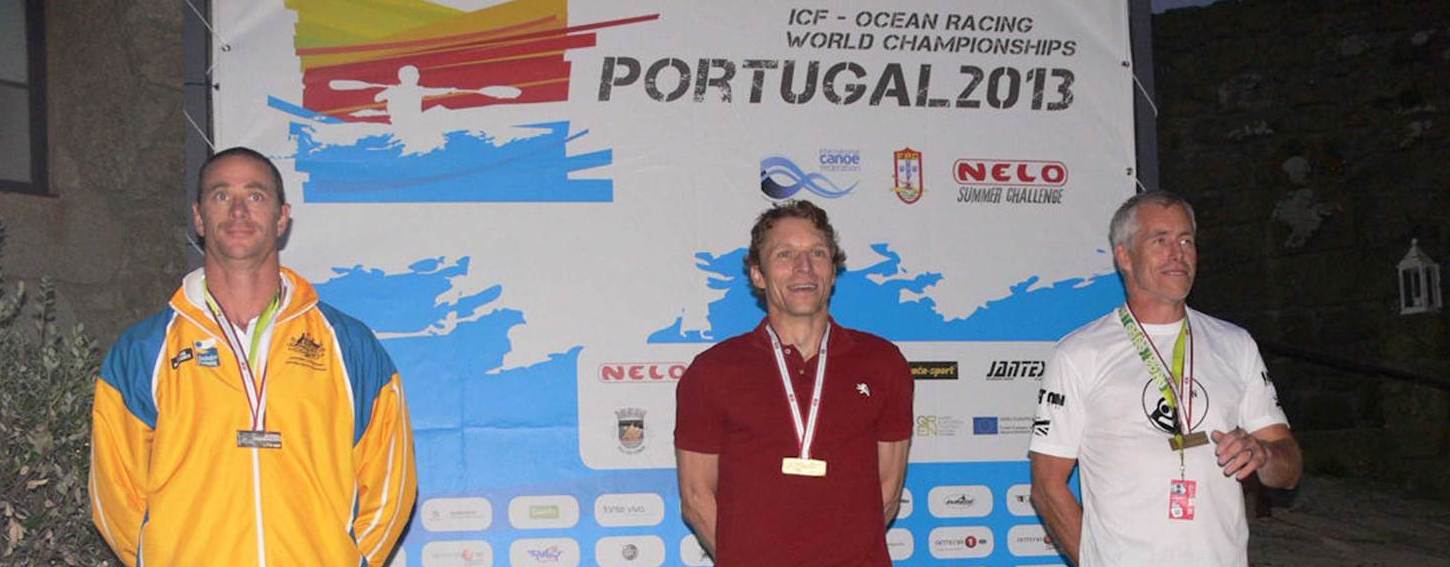
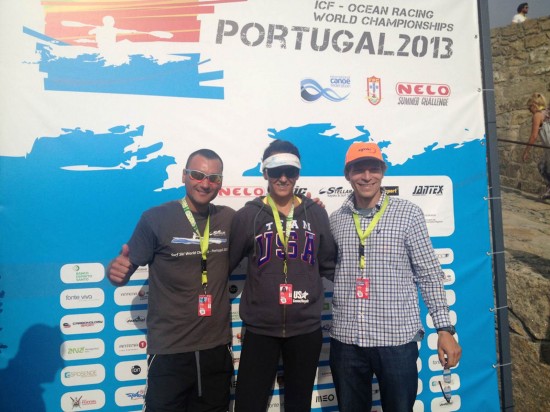
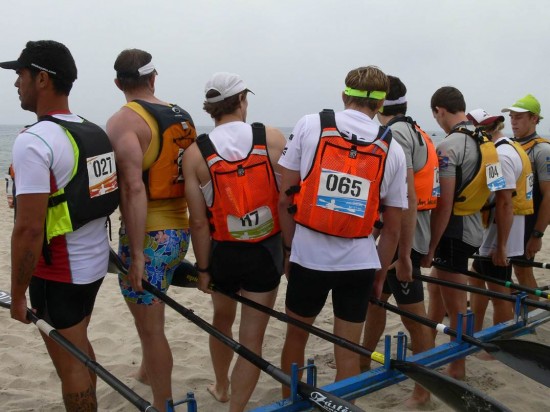
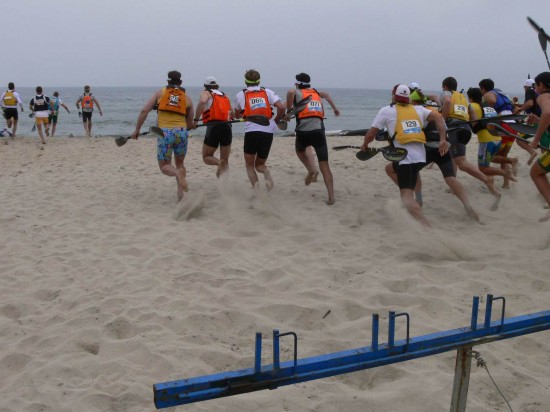

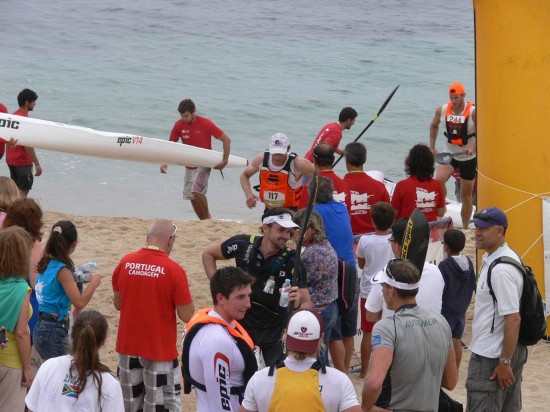
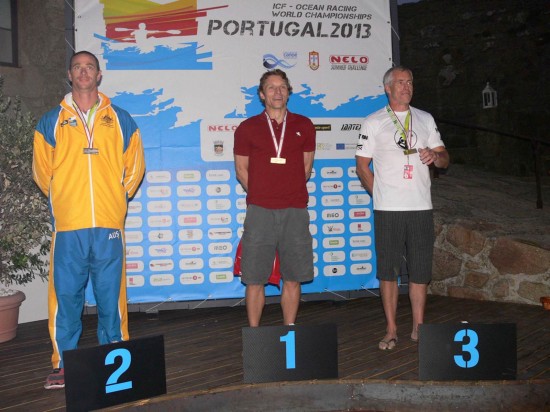
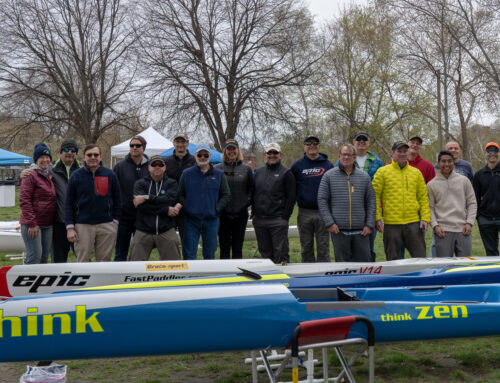
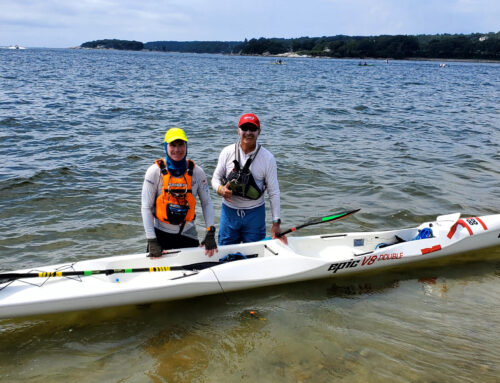
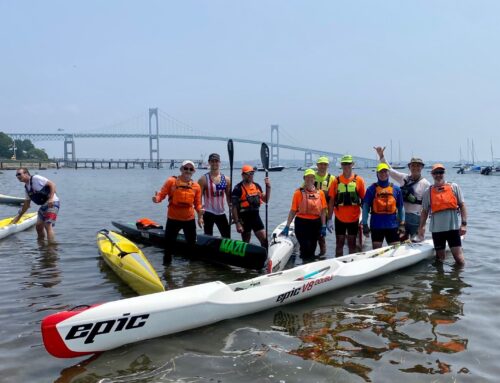
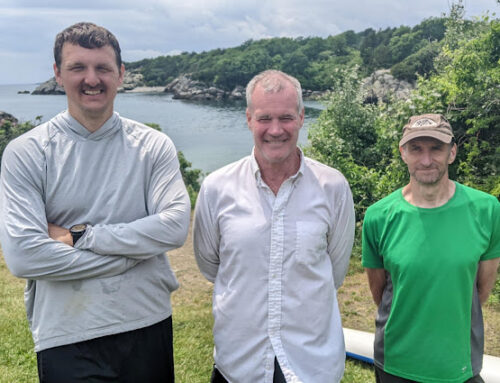
Leave A Comment
You must be logged in to post a comment.